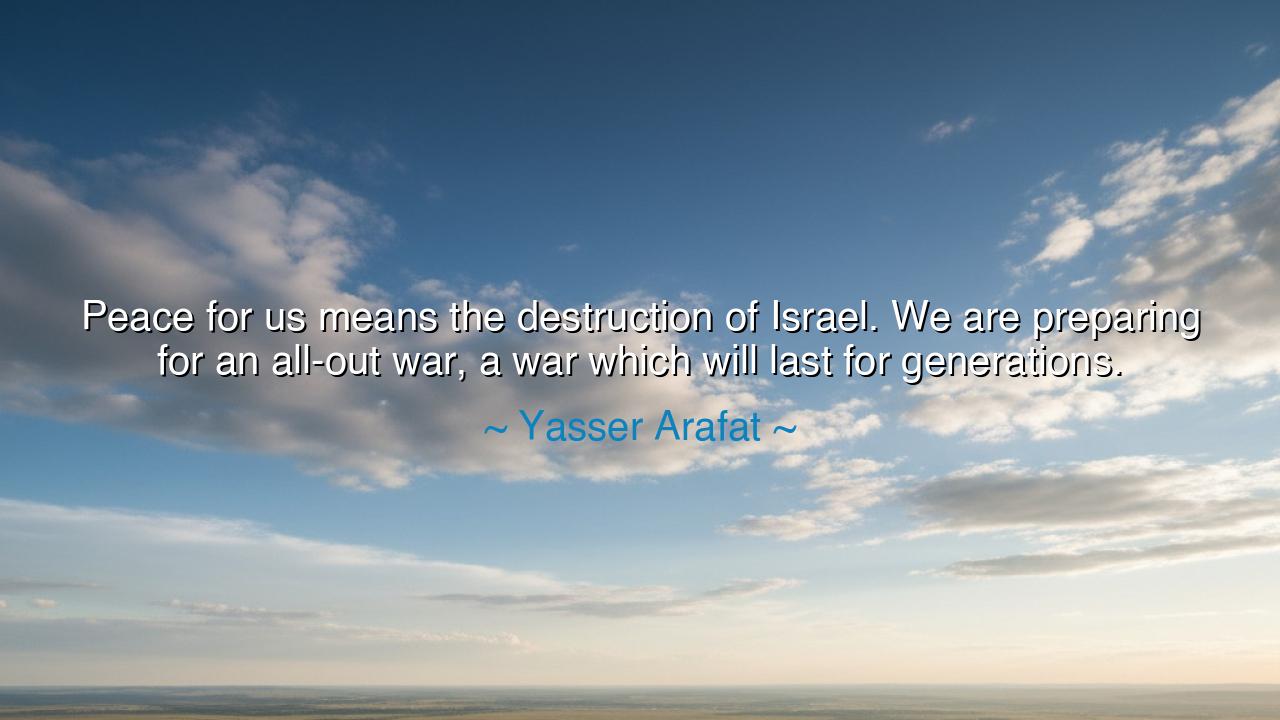
Peace for us means the destruction of Israel. We are preparing
Peace for us means the destruction of Israel. We are preparing for an all-out war, a war which will last for generations.






Hear the fiery and unsettling words of Yasser Arafat, who declared: “Peace for us means the destruction of Israel. We are preparing for an all-out war, a war which will last for generations.” These words are not the gentle blessing of reconciliation but the thunder of defiance, born of anger, suffering, and the unyielding struggle of a people who felt dispossessed. They echo with the tragic reality that when wounds are deep and justice seems far, even the very word peace can be twisted to mean victory through destruction rather than harmony through coexistence.
To call peace the destruction of another is to reveal a profound paradox. For Arafat, speaking as leader of the Palestinian cause in its most militant days, peace did not mean coexistence—it meant the triumph of one people over another. His declaration carried both the pain of displacement and the iron will of resistance. Yet these words also remind us of the peril of hatred: when peace is redefined as conquest, the cycle of war is endless. It is a warning that peace built upon the erasure of an enemy is no peace at all, but only the mask of vengeance.
The mention of generations shows the depth of this conflict. Arafat foresaw not a single battle, nor even a single war, but an inheritance of struggle, passed down like a grim legacy from parents to children. This was the voice of a leader who believed that identity itself was forged in resistance, and that the road to justice was paved only in endless confrontation. Yet in this lies tragedy, for generations raised in war come to know little else, and the hope of reconciliation fades with each passing decade.
History mirrors this truth. Consider the Hundred Years’ War between England and France. What began as a dynastic quarrel became a conflict of generations, shaping entire nations in the image of war. Each new child grew under banners of hostility, each new ruler inherited not only lands but enmities. And yet, after more than a century of destruction, neither side truly gained what it sought. The lesson is bitter but clear: wars fought for generations devour the very people they claim to defend.
The emotional power of Arafat’s words lies in their raw honesty. They strip away the illusions of easy compromise and reveal the heart of a people that felt peace could not exist alongside what they perceived as injustice. But his words also reveal the blindness that comes with anger: to define peace as destruction is to abandon the true meaning of peace itself. For peace cannot be founded on the graves of others—it can only be built when life, dignity, and mutual recognition are upheld.
The lesson for us is this: beware of any vision of peace that rests on annihilation. Peace cannot be achieved through conquest, domination, or erasure of others. Lasting peace is forged only when both sides are willing to recognize the humanity of the other. To teach our children that war is their destiny is to bind them in chains of hatred; to teach them that peace is coexistence is to free them to imagine a different future.
Practical wisdom follows: in your own life, when you face conflict, do not define your victory as the destruction of another. Do not pass hatred as an inheritance to those who come after you. Seek instead the harder path: to listen, to understand, to seek solutions where both can live. For though vengeance may feel righteous in the moment, only reconciliation bears fruit that can last beyond one generation.
So let Arafat’s words stand not as a model, but as a warning: “Peace for us means the destruction of Israel… a war which will last for generations.” Remember this truth: when peace is redefined as conquest, the war never ends. But when peace is embraced as coexistence, even enemies may one day become neighbors. Let future generations inherit not wars without end, but the possibility of life without fear.






AAdministratorAdministrator
Welcome, honored guests. Please leave a comment, we will respond soon